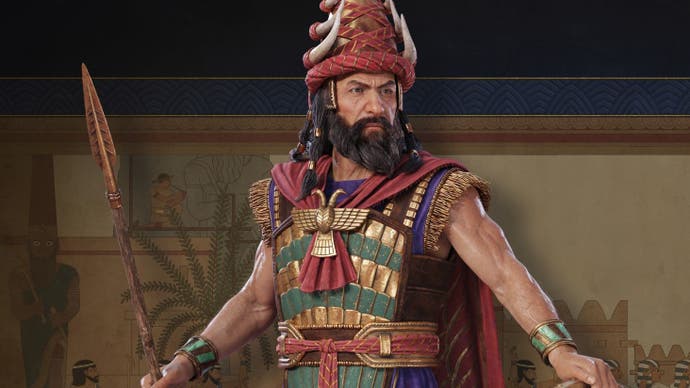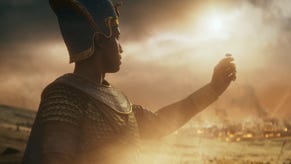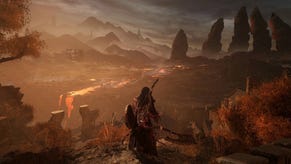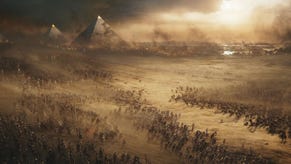Total War: Pharaoh review - skip the battles and enjoy a great grand strategy campaign
Pyramid schemes.
The year is 1200 BC and, in bronze age Egypt, Pharaoh Merneptah is worried about his legacy. His maniac son Seti is set to inherit the kingdom, but Ramesses is building support to the north east. Canaanite generals are poised to take advantage of any sign of weakness in the Egyptian ranks, and to the north, in modern Turkey, the Hittites are in a desperate battle for survival.
There's a sense of dread to the opening state of the map in Total War: Pharaoh, but it's perfectly poised if you like the idea of aggressively surging beyond your starting territory, taking a strong early foothold and then working to gain enough notoriety to eventually challenge for the throne. In classic Total War fashion, you advance your cause each turn by building up your cities, recruiting armies, pushing them around on the grand strategy map, and then diving into huge real-time battles to take new territory and see off enemy armies. Maybe, with enough political scheming, and a few massive armies, your nation can avoid the late bronze age collapse entirely.
On the grand strategy level Pharaoh is one of the best board games of the Total War series. Each of the leaders in the three available factions are well characterised, and start with a few clear faction objectives to usher you through the first ten turns or so. After that you get to decide what sort of objectives will earn you notoriety - do you want to become known for taking cities or turning enemies into allies through trade and bargaining? This Legacy system sets the flavour of your entire playthrough, and meshes nicely with your leader's faction-wide Royal Decree boosts, and time-limited events that might give you a windfall or upset your plans.
Pharaoh's campaign strikes a great balance between control and chaos. It gives you just enough agency to set short and long-term objectives while also throwing interesting emergent challenges in your path. Seasonal events, droughts, and bickering pretenders to the throne force you to react, but in spite of these chaotic elements the campaign feels more pared down and directed than some other Total War games.
If you love the sprawling sandboxes of Empire or Three Kingdoms you might find that Pharoah spends a little too much time trying to push you into a particular historical groove. If you don't mind that, and if you're entirely new to the series, Pharoah drops a comfortable number of decisions in your lap turn by turn, and I have found it to be one of the most well-paced Total War games at the campaign level.
An hour of play tends to serve up a couple of battles, a few key decisions, and the map had always changed significantly by the time I got up to make some tea. You can also push past those Legacy objectives using the welcome Campaign Editor, which lets you modify key elements like starting positions and resource levels. If you want to raise loads of armies and charge around the map without having to worry about food upkeep costs, you can adjust a few sliders and go for it. Modders offered tweaks like this for ages and it's great to see official in-game options that puts more power in players' hands.
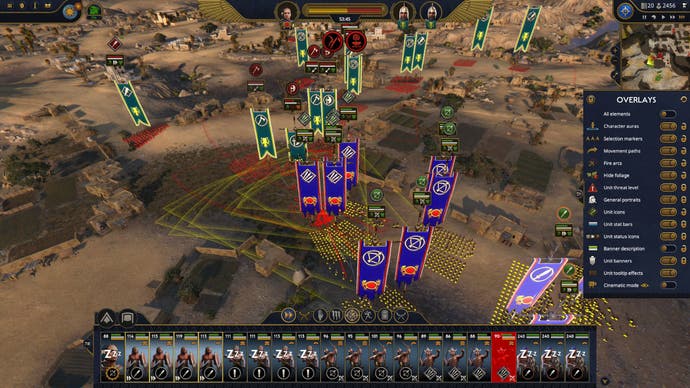
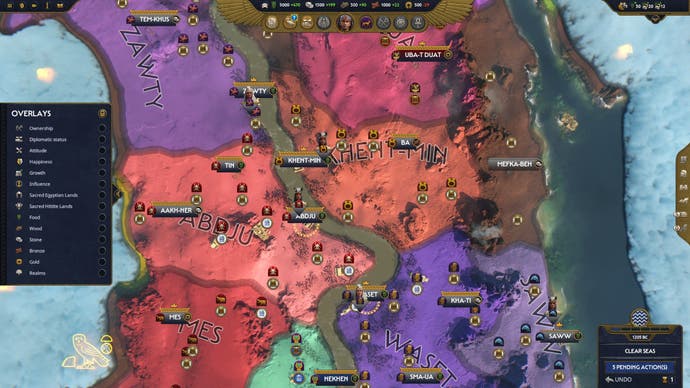
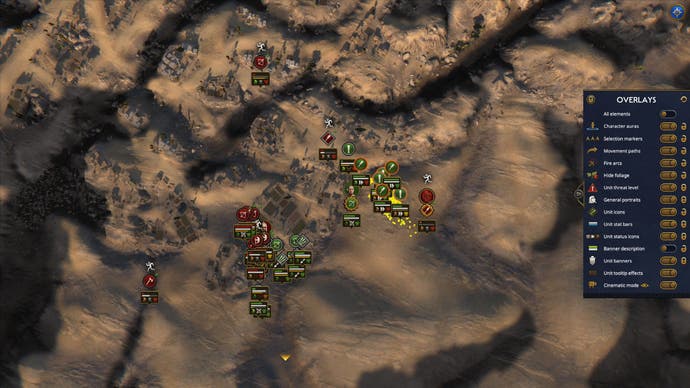
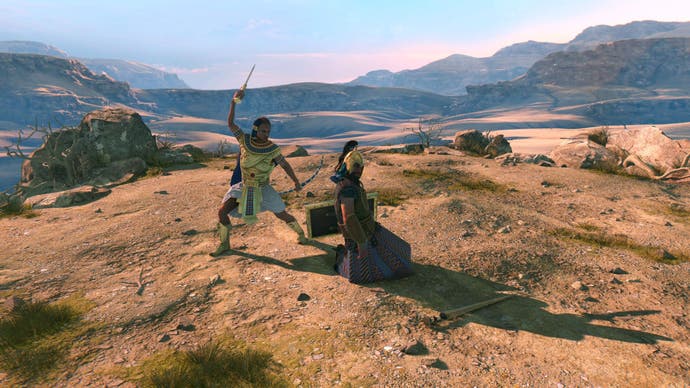
In my main campaign I decided to surge eastwards with the upstart Ramesses, picking up a few easy wins and earning notoriety and loot for each conquest. As well as the typical bonuses for sacking cities you also gain gear for your generals and their retinues. I was initially happy for Ramesses to wield a bow and stay out of trouble, but now he has a fine sword and, more importantly, a good shield. Generals earn titles based on their deeds, which you can slot into their character profile as they level up. These light-touch RPG elements aren't entirely new for Total War, but they serve up palpable rewards - beyond incremental stat boosts here and there - which make victories a little bit sweeter.
Sadly, the battles themselves haven't been so satisfying. Pharaoh has the excellent regional recruitment system that lets you pick up localised units in different areas, but the selection of unit archetypes feels limited and it's hard to see meaningful differences between different varieties of swordsmen, axemen, cavalry units and bow or javelin troops on the battlefield.
The addition of unit stances is a good idea, in theory. These let you activate specialised behaviours in the middle of combat. A javelin unit might be able to target the spokes of charging chariots to limit their speed, or a unit of close combat brawlers might start setting fire to nearby buildings. In practice these abilities tend to be quite situational and it can be hard to see if they are actually working or not. Pharaoh suffers from a tendency in Total War games with a strong close combat melee focus, in which units tend to be absorbed into a huge murderous blob that you can't particularly affect. Too often I felt the need to put most of my time into army deployment before just shoving the force forwards in full fast-forward mode.
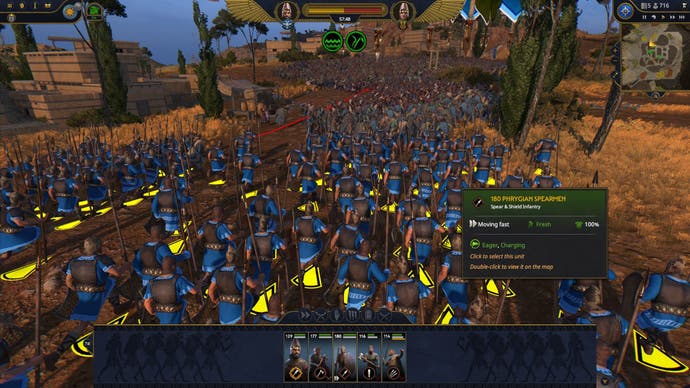
Admittedly the units are a reflection of this era's style of warfare, and it might be too unnatural for hordes of engaged fighters to be able to instantly disengage and redeploy, but the problem is exaggerated by a lot of maps built around chokepoints and narrow pathways. It is always awkward to funnel hundreds of fighters through these small valleys, and picking the right routes to outmanoeuvre the enemy can feel like a matter of guesswork. The rewards for flanking are great, but battles often feel imprecise and difficult to read. Amassing the greater number of units and auto resolving always feels like the best strategy.
To be honest, it's a relief to click 'End Battle' and return to the campaign screen, where political intrigue, religious concerns and the threat of total social collapse loom large. Pledging your faction to particular gods and building monuments can be a good way to earn victory points, but it's important to consider the status quo. Be sure to watch the 'Pillars of Civilisation' bar at the top of the campaign screen. If the Nile is fertile, the people are happy, and the scattered Cult Centres still stand then Egypt remains strong. Irsu the Ravager of the Canaanites might have other ideas, of course. The button that kicks off his campaign simply reads 'BURN IT ALL DOWN!'
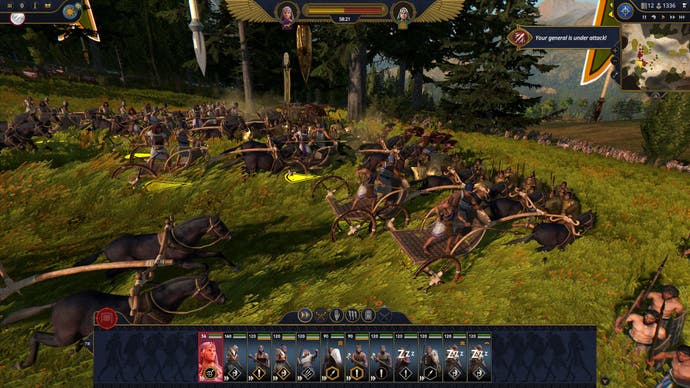
Total War games tend to pivot on big ambitious releases followed by follow-ups that try to refine ideas and in a slightly trimmed-down format, often on smaller maps set within a narrower band of history. The bloated, exciting ambition of Empire: Total War gave way to the excellent Napoleon: Total War with better maps and a fascinating mix of gun line, artillery and cavalry troops. Atilla followed Rome 2 with new rules for nomadic expansion on the campaign map and a quietly excellent Sassanid campaign. The 'Saga' title isn't attached to Pharaoh, but it certainly feels like one of the smaller, more refined iterations of the Total War idea. Smaller doesn't mean worse, however, and there's a lot to be said for a grand strategy game that can create good stories in relatively short bursts of time.
The three available factions could easily be expanded, but I can forgive the lack of major contemporaneous nations when there's a strong core of leaders to experiment with. That sense of personality and the moreish, steady sense of campaign process is what I enjoy most about Total War: Pharaoh. On those terms it's a dependable grand strategy game with strong factions and a great setting. The battles are lacklustre, but easily skipped, and it's well worth the time to carve out a spare hour or two, start a few different campaigns and wreak havoc amid the dunes in a region on the edge of calamity.
A copy of Total War: Pharaoh was provided for review by Sega.
